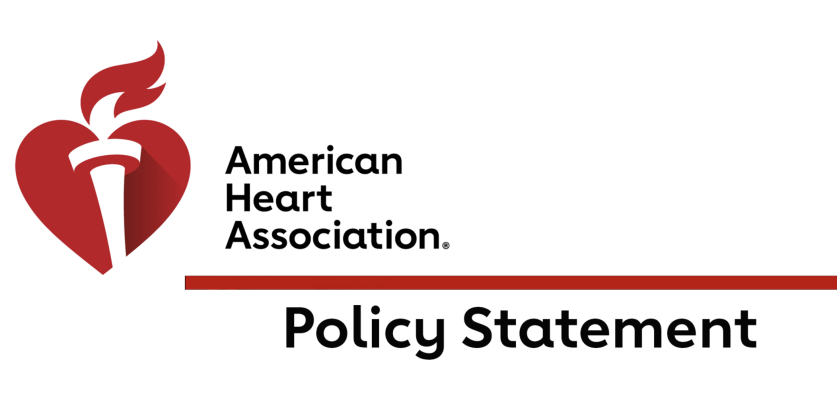
The American Heart Association has issued a new Policy Statement focused on the need to address structural racism as a central component to reducing cardiovascular disparities across the United States. Image courtesy: AHA
January 18, 2024 — A new American Heart Association (AHA) policy statement examines the history of structural racism, and offers public policy considerations for several key social drivers of health disparities, including health care, healthy food and nutrition access, access to capital, housing, education and the environment.
Highlights from "Addressing Structural Racism Through Public Policy Advocacy: A Policy Statement from the American Heart Association" include:
- During the past few years, the largest increases in cardiovascular disease deaths were among Asian, Black and Hispanic adults in the U.S.
- Generational socioeconomic adversity, especially among diverse racial and ethnic groups in the U.S., is tied to structural discrimination.
- The new policy statement builds on the Association’s 2020 Presidential Advisory, which identified structural racism as a cause of poor health and premature death from heart disease and stroke and discussed opportunities to leverage public policy to promote overall health and well-being and rectify structural barriers that impede progress toward optimal health for all people.
The Association, which is commemorating its 100th anniversary in 2024, advises a multipronged approach to address structural racism through public policy that involves centering equity, understanding the lived experience, cultivating powerful cross-sector partnerships and defining metrics for success.
The statement issued Jan. 16 by the American Heart Association is offered in its entirety below.
The existence of structural racism creates a barrier to equitable access to health care and as a result is a fundamental driver of health disparities in the U.S., concluded a 2020 American Heart Association Presidential Advisory. A new policy statement from the American Heart Association, Addressing Structural Racism Through Public Policy Advocacy, offers public policy considerations to address several key social determinants of health, such as health care, healthy food and nutrition access, access to capital, housing, education and the environment. The statement was published Jan. 16 in Circulation, the Association’s flagship peer-reviewed scientific journal.
The new policy statement builds on the Presidential Advisory, which identified structural racism as a cause of poor health and premature death from heart disease and stroke and discussed specific opportunities to leverage public policy to promote overall health and well-being and rectify structural barriers that impede progress toward optimal health for all people in their communities. During the past few years, the largest increases in cardiovascular disease deaths were among Asian, Black and Hispanic adults in the U.S.
“Structural racism has had a profound impact on the health and survival of many people, particularly in diverse racial and ethnic communities,” said writing group Chair Michelle A. Albert, M.D., M.P.H., FAHA. Albert is immediate past volunteer president of the American Heart Association; immediate past president of the Association of Black Cardiologists; and director of the University of California, San Francisco UCSF Center for the Study of Adversity and Cardiovascular Disease (NURTURE Center), where she is the Walter A. Haas-Lucie Stern Endowed Chair in Cardiology and professor of medicine.
She continued, “Improving health outcomes in communities of color is imperative and requires addressing strategic public policy shifts at the intersection of structural discrimination and health equity, including but not limited to public health institutions and data infrastructure, health information technology and civic engagement. This statement has more than 60 policy ideas intended to help serve as a framework or template among collaborators at national and even international levels.”
The statement presents policy considerations in the spirit of shared responsibility and collective action. The Association encourages a multidimensional approach to address structural racism through public policy that is centered on health equity, informed through lived experience, inspired by cross-sector partnerships and accountable through defined metrics for success.
“Removing barriers to health equity will require ongoing, specific and collaborative efforts,” said the Association’s current volunteer President Joseph C. Wu, M.D., Ph.D., FAHA, director of the Stanford Cardiovascular Institute and professor of Medicine and Radiology at Stanford University School of Medicine. “We welcome and call for a broad coalition of stakeholders across disciplines and industries to address structural racism in both policy and practice. The American Heart Association commits to being a leader and an ally in improving social determinants of health and tackling the root causes of health inequities.”
The policy statement was crafted by a volunteer writing group on behalf of the Association’s Advocacy Coordinating Committee. The AHA notes that its policy statements help position the Association on public policy issues that will impact cardiovascular health and mortality; guide advocacy work at all levels of government; allow for support of the important work of others; and inform policymakers, practitioners, health care professionals, researchers, the media and the public.
Additional co-authors and members of the writing group are writing group Vice Chair Keith Churchwell, M.D., FAHA, Yale School of Medicine, the Association’s president-elect, along with: Nihar Desai, M.D., FAHA; Janay Johnson, M.P.H.; Michelle Johnson, M.D.; Amit Khera, M.D., FAHA; Jennifer Mieres, M.D., FAHA; Fatima Rodriguez, M.D., M.P.H., FAHA; Gladys Velarde, M.D., FAHA; David R. Williams, Ph.D.; Joseph C. Wu, M.D., Ph.D.
More information: www.heart.org


 November 14, 2025
November 14, 2025 









